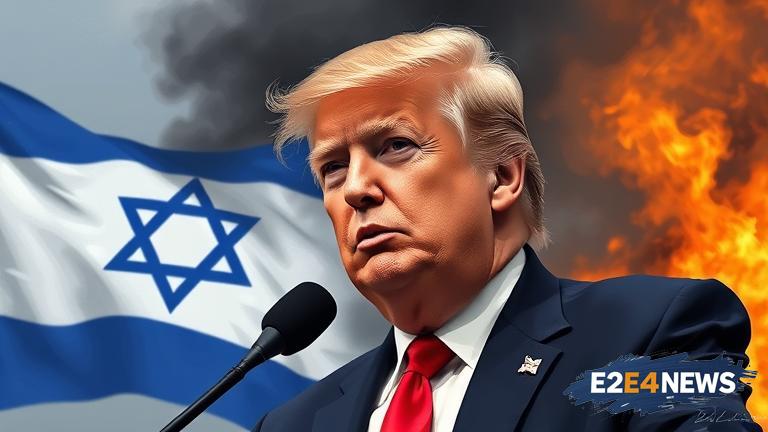The ongoing conflict between Israel and Gaza has taken a significant turn with US President Donald Trump’s recent statement predicting a conclusive ending to the war within two to three weeks. This forecast has sparked a wave of concerns and debates about the potential outcome of the conflict. The Israel-Gaza war has been a longstanding issue, with both sides experiencing periods of relative calm punctuated by outbreaks of violence. The conflict has resulted in significant loss of life and damage to infrastructure, with the Gaza Strip facing severe economic and humanitarian challenges. The international community has been calling for a peaceful resolution to the conflict, with many countries and organizations advocating for a two-state solution. However, the situation remains complex, with deep-seated issues and competing interests at play. Trump’s prediction of a conclusive ending to the war has been met with skepticism by some, who argue that the conflict is deeply entrenched and unlikely to be resolved quickly. Others have expressed concern that the US president’s statement may be seen as an attempt to exert pressure on the parties involved, potentially undermining the chances of a peaceful resolution. The Israeli government has been pursuing a policy of military action against Gaza, with the aim of reducing the threat posed by militant groups such as Hamas. However, this approach has been criticized by many, who argue that it is unlikely to achieve a lasting resolution to the conflict. The Palestinian Authority has been seeking to negotiate a peaceful settlement, but its efforts have been hindered by divisions within the Palestinian leadership and the lack of a unified position. The international community has been providing significant humanitarian aid to the Gaza Strip, but the situation remains dire, with many residents facing severe poverty, unemployment, and lack of access to basic services. The conflict has also had a significant impact on the regional security situation, with many countries in the Middle East expressing concern about the potential for the conflict to escalate. The US has been playing a key role in efforts to resolve the conflict, with Trump’s administration having unveiled a peace plan that has been met with widespread criticism. The plan has been seen as heavily biased towards Israel, and many have argued that it is unlikely to achieve a lasting resolution to the conflict. Despite the challenges, there are still many who believe that a peaceful resolution to the conflict is possible, and that the international community has a critical role to play in supporting efforts to achieve this goal. The situation remains highly volatile, with the potential for further violence and escalation. However, there are also many who are working tirelessly to promote peace and understanding, and to support the development of a more stable and secure region. The next few weeks will be critical in determining the outcome of the conflict, and the international community will be watching closely to see how events unfold. The US president’s prediction of a conclusive ending to the war has added a new layer of complexity to the situation, and it remains to be seen how this will impact the chances of a peaceful resolution. As the situation continues to evolve, one thing is clear: the need for a peaceful and lasting resolution to the conflict has never been more urgent. The international community must continue to work together to support efforts to achieve this goal, and to promote a more stable and secure region for all. The conflict has significant implications for the region and the world, and it is essential that all parties work together to find a peaceful solution. The US, Israel, and the Palestinian Authority must engage in meaningful negotiations, and the international community must provide support and guidance to help achieve a lasting resolution. The situation is complex, but with determination and commitment, it is possible to achieve a peaceful and stable future for the region. The coming weeks will be critical, and the world will be watching to see how events unfold. The potential for a conclusive ending to the war is uncertain, but one thing is clear: the need for a peaceful resolution has never been more urgent. The international community must continue to work together to support efforts to achieve this goal, and to promote a more stable and secure region for all.
